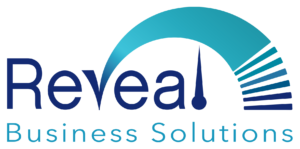Our Top 10 End-of-Year Reminders & Tips
By: Valerie Briley, CPA, Founder, and Chief Business Driver, Reveal Business Solutions
The end of the year for business owners is like spring cleaning. You begin to look forward and get energized. We agree! We wanted to share a few ideas to help you buzz into 2023 with intention:
- Create a budget
A budget’s primary function is to ensure you have enough resources (profit & cash) to meet your expenses and implement goals. We love budgets because they provide a data-driven plan for the business for the new year. It can help focus your attention and drive initiatives to completion. A detailed budget can help you identify problems before they occur and allow you to pivot quickly. - Review Fixed Assets
Capitalized assets remain on the balance sheet while in use and are depreciated over their useful life (for book purposes, straight-line, for tax, there may be an accelerated method). However, if assets are sold or otherwise disposed of, they should be removed from the books and a corresponding gain or loss recognized. While this should happen throughout the year, year-end is a good time to review the assets on your balance sheet and ensure they are still in service.
- Employee Gifts & Bonus Payments
Gifts and bonuses are entirely voluntary, but if you choose to give them, here are some guidelines.
Non-cash gifts
Food items fall under special and favorable rules. They are not counted as income to the employee, but the cost is deductible to your business.
Non-cash, non-food gifts to employees with a value of more than $25.00 are considered income to the employee and should be reported on their W-2, which requires withholding and employer match. They are deductible to the business.Cash gifts
Any gift in cash, check, or cash equivalent must go through payroll and be reported as income to the employee. You can gross up to the value in payroll so the employee receives a set net amount.Bonus Payments
We are frequently asked why bonus payments are taxed at a higher rate than normal payroll; here’s the scoop. The IRS considers bonuses supplemental wages (rather than regular wages). Supplemental wages follow different tax withholding rules. Ultimately, when tax returns are filed, you pay tax on your taxable income, and if you’ve overpaid through over-withholding, you’ll get a refund). It’s also important to note that all compensation is subject to 401k deferment per IRS rules.If you pay bonuses after year-end, you can still deduct them in the current year if they were earned for services performed in the current year and are paid within 2.5 months after year-end. - Profit-sharing match
Most 401k plans offer the option for a profit-sharing match. This type of contribution can be in place of, or in addition to, an employer match. The benefits of a profit-sharing match are that it is fully deductible to the employer and isn’t subject to Social Security or Medicare withholding. - Payroll rate updates
Did you know that your unemployment insurance rates are updated annually? Near the end of the year, you will receive notices with your new rates for 2023. These should be updated in Gusto or your payroll software so the right amount of tax is calculated and remitted. - Restaurant Meals are no longer 100% deductible in 2023
The extra deductibility for meals provided by the Consolidated Appropriations Act of 2020, which allowed a 100% deduction for business meals provided by restaurants, is expiring on December 31, 2022. We separated those meals into a special account for 2021 & 2022. Beginning January 1, 2023, we’ll revert to using the appropriate meal deduction accounts for categorizing transactions. - 401k & Simple Plan Limit Increases
The amount individuals can contribute to their 401(k) plans in 2023 will increase to $22,500, up from $20,500 in 2022. The catch-up contribution for employees aged 50 and over will increase to $7,500.
The amount individuals can contribute to their SIMPLE retirement accounts will increase to $15,500. The catch-up contribution for employees aged 50 and over will increase to $3,500. - Owners’ distribution accounts
We recommend the separation of personal and business expenses. A best practice is to take a reasonable salary (if you are an S-Corp) and/or draws as appropriate and pay your personal expenses via your personal accounts. It’s a good idea for you to review the distribution accounts in QBO to ensure that transactions have been categorized correctly. - Current and departed employees’ contact information
Annual W-2 reporting is just around the corner. Gusto offers you and your employees the option to receive W-2 in paper form via mail or electronically. Now is a good time for you and your employees to verify their election and confirm contact information. If you have departed employees, they are requested to add their contact information during off-boarding, but if you have received any notifications of change in physical or email address for departed employees, please work with our team to get that updated in Gusto. - Tax planning
It’s a good idea to connect with your tax preparer throughout the year, especially before year-end for tax planning. There may be some good strategies they can recommend, but many of these need to be implemented prior to the end of the year. Additionally, while you may have made estimated tax payments during the year, they are typically based on your prior year’s taxable income. The IRS will not charge you an underpayment penalty if you pay at least 90% of the tax you owe for the current year or 100% for the previous year. But this safe harbor rule can lead to you getting a surprise when you file your actual return or extension.
If you have questions or need help understanding your finances, contact our team today!
